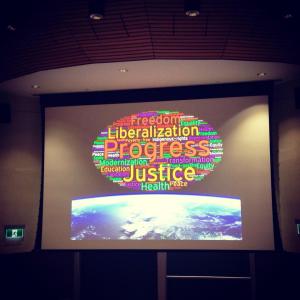This past weekend I had the privilege and pleasure of attending the 3rd annual Action Global Health Network Conference in Ottawa; an insight and thought-provoking event bringing students together from various faculties to explore this year’s theme of “Global Development and Sustainability: Are we making an impact?”.
The workshops, keynote addresses, discussions and networking sessions were all extremely inspiring and without a doubt prompted members of the audience to reflect on notions such as global citizenship, global health, volunteerism and sustainable development; allowing such abstract concepts to become more tangible through dynamic discussion and the presentation of novel perspectives and ideas by the speakers.
For the purpose of this piece I am choosing to focus on one particular perspective that was presented at the conference which had a great impact on me. One that I feel lends itself well to the over-arching theme of emotional wellness that I do my best to project through positively profession-elle…
I will start off by saying that now, more than ever, there is an evolving sense of connectedness between people from all over the world in the context of a growing and dynamic global community. You can travel to remote countries within mere hours via plane, you can brew coffee in the comfort of your own home using roasted coffee beans from the deepest parts of the Amazon, you can skype with a friend in real time from over-seas and you can read about breaking news from across the world in a blink of the eye. Technological advances in transportation and communication, amongst numerous other fields, have allowed people to connect it ways that were unimaginable to our predecessors….and yet, is the type of interconnectedness that we are seeing evolve always feeding and nurturing our basic social needs as human beings in a healthy manner?
Many of you may be thinking of doing some sort of volunteering or internship abroad at some point in your academic or professional careers. In doing so, it is important that we take on the role of a global citizen, which in and of itself can carry many meanings, with the most responsibility and sensitivity possible. It is important that, upon embarking on any global initiative, we truly reflect on the type of impact that will come about from the work we will be doing. How might we be changing the community in which we are working? What possible impacts will we have on the culture of the area? Are these impacts all positive or might there be a negative aspect as well? Is what we are working towards sustainable? Are we empowering the people we are working with? Are we being cognizant of the culture in which we find ourselves? There are no right or wrong answers to these questions but they are indeed important for self-reflection when embarking on global volunteerism or internship initiatives!
The particular perspective that I wanted to highlight in this post is, in a way, a means by which one may attempt to address the element of sustainability in the context of global development work. The perspective was presented by one of the keynote speakers, Dr. Rachel Thibault, an occupational therapist whose work has transcended international borders through her work with underprivileged populations on a global stage.
Among the many elements that come to mind when thinking of global health and development, such as nutrition, sanitation, shelter, access to medical care and medical supplies, Dr. Thibault drew the audience’s attention to the idea that helping to create a sustainable impact, in the context of global health work, may in fact rest in setting populations up with opportunities that foster resilience. This idea really resonated with me!
Dr.Thibault spoke of eudaimonic activities; activities that have been shown to allow for resilience through the practice of centering (activities that free one of negative and anxious energy to bring one back into focus), contemplation (such a prayer, meditation and meaningful thinking in solitude), creation (creating beautiful things), contribution (feeding a need for helping and connecting with others) and connectedness.
She beautifully presented us with the notion of promoting eudaimonic activities as a way of offering populations the opportunity to foster more resilience in their communities, which is a very sustainable way of making an impact; in her words we should try to “create conditions conducive to the practice of intentional activities that will improve the social fabric.” I think this is a very insightful and novel perspective to consider when embarking on any type of international work and I encourage you all to consider it when the time comes!
To finish, I want to bring the idea closer to home; we can practice eudaimonic activities in our very own lives! Dr. Thibault touched upon the presence of “unrestrained use of technology” in our world; are we really cultivating a healthy sense of human inter- connectedness in our own lives or has this social aspect of being been hampered by technology today? Definitely food for thought…

